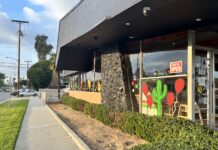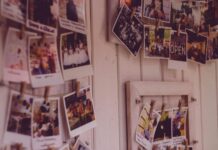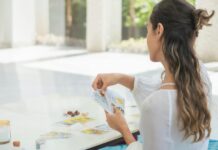
It’s homecoming week, a couple of hours before Heat is to begin. Finally, the majority of students are staying in Riverside for the weekend. The men’s basketball game is filled with fans shouting on their feet after the Highlanders just made a three-pointer from beyond half-court with a second left in the half. The team leaves and fourth-year biology student Peter Ajoku, who goes by “Rocky,” takes to the court with his guitar and band of singers, guitarists, drummers and violinists.
Ajoku shouts to the crowd already at their feet, “What’s up UCR! If you believe you’re a shooting star then make some noise!” His song begins and he bounces and runs around, getting the crowd to sing the chorus, “We are superstars / we are champions / representing UCR to let it all hang out / we are the chosen ones to make our home crowd proud / We are shooting stars.” The band keeps the song pumping. What started as a song to be played for the NBA has turned into a song about us.
“One of the things I love about the NBA is the passion and intensity they put into competing. I wanted to write a song to show this. My message as an artist is to uplift people. When Dr. Matt Zebley [Grammy award winner and lecturer at UCR] first heard the song he fell in love with it and saw the potential it had and told me to make the song reflect UCR,” said Ajoku.
The main reason Ajoku wanted to create this song was to inspire other people. He lived a life that many of us can’t imagine. He had to rely on himself from an incredibly young age and still relies only on himself to succeed in life.
“I just want to just touch other people with this song,” said Ajoku.
Ajoku was born in Oklahoma and lived in the states for only two years before his father left his brother, his mother and him. They took what little they had and moved back to his mother’s home in Nigeria and lived outside of Kaduna in an impoverished village called Kabala Donkey. His mother suffers from severe Bipolar Disorder which meant that he had to rely only on himself to survive and keep his brother alive.
“I remember having to eat trash off the streets. We would have to drink water from stagnant pools wherever we could find them,” recalls Ajoku.
One of his earliest memories of Nigeria includes the well in his hometown. Ajoku could have easily gone to the well to get much cleaner water than the puddles around him, but there was something that kept him from this. Many children were afraid to pull water from the well because it was just a hole in the ground and children fell in often, left to drown until adults could get ropes down to pull up the bloated and discolored body of another six-year-old.
While many people had parents to raise them their entire lives, Peter didn’t. Just a simple task like getting water at such a young age has taught him the necessities to not only survive but to have the drive to accomplish all that he sets out to do. “I’ve been independent all my life. I put myself through schooling. I had to work by keeping up all types of jobs.”
“I remember there was a farm in Nigeria. I was tilling the soil each day for around 18 hours, sleep for five hours and go back the next day, my back hunched over with an Indian hoe. I did this to keep my brother and mother fed,” recalls Ajoku.
One thing that kept Peter moving every day, while bent over under a sun that even the most seasoned Riverside local would call too damn hot, was music. He remembers how he would spend the days singing as loud as possible while digging through clay-like dirt to hopefully create something to plant. It was in these dirt fields that he wrote his first song, “Momma Don’t Cry.” He was 14 years old and constantly kept his troubling mother on his mind while working. He wrote the song for her.
Ajoku’s life in Africa shaped him into the caring and thoughtful individual he is today. He doesn’t feel like he was dealt the wrong card. He embraces the numerous obstacles that he has faced and uses them to become a better person. But Africa wasn’t the end of his struggles.
One day after school in his junior year of high school in Nigeria, he received a phone call. It was his dad, who he hadn’t seen or heard from since he was two years old. His father wanted him and his brother to come to Chicago so he could finally take care of them. Peter couldn’t believe it. He was astounded. After talking it over with his brother and hearing the mistrust their mother had for their father, they decided to go anyway. He wanted the opportunities that he saw in his father and America.
Ajoku and his brother first moved to their dad’s home in Chicago, but he then moved them out to Fontana to start a new life. He was ecstatic to finally get the opportunities that many students have with parents watching over them, but things quickly turned for Ajoku and his 16-year-old brother. After only seven months of being in the U.S. his father left them in Fontana and moved back to Chicago for work. They were once again left to fend on their own.
Ajoku eventually graduated high school without any help from parents. He and his brother shared a room in his dad’s ex-wife’s house in Fontana when he started community college, riding his bike 15 miles just to get to school, then to work and finally home to get a few hours of sleep. Peter spent two and half years at community college before he found himself holding an acceptance letter from the University of California, Riverside.
He transferred to UCR and spent many nights studying at Freshh Donuts on Blaine Street until 3 a.m., singing and studying with Mr. Lee, the baker. Mr. Lee was so moved by Peter’s kindness and voice that he went out and bought Peter’s first musical instrument, an acoustic guitar.
It is likely that students have seen Ajoku wandering around campus belting out a Bob Marley song or one of his own, providing a soundtrack as students hustle from class to class. If you’re up late enough studying in the libraries you might even catch him singing by the bell tower; “I sometimes like to sing near the bell tower around two in the morning so I can just sing as loud as I can. It has great acoustics,” stated Ajoku.
“Coming to UCR is a blessing, just the people are amazing. UCR is a family. Everyone is happy and loves each other. It’s not just a school. This is a place where people come together and, it’s just…it’s beautiful,” said Peter.
Ajoku worked hard at the guitar and found himself writing songs after only owning the instrument a month and he was soon performing with the UCR Jazz Ensemble. He began writing his own songs at the beginning of this school year and recruited the top student musicians to form a band. His outgoing demeanor quickly drew in musicians and before long they had a theme song for UCR.
“We started working on the parts of the song and kept adding more musicians. Peter is the one that made all of this happen. He never gave up and worked very hard. He went to all the necessary measures to get this band together, to write the song and to perform it at Homecoming. That’s what this song is about,” stated guitarist Stephen Fong.
“Peter is not only a creative individual but a genuinely decent guy. His warm and friendly demeanor always makes it a pleasure to work with him. His composing, coordinating and ability to spot talent has inspired me to do the same. If a biology major can do all of this, then certainly I can as a music major,” stated bassist Nathan Guze.
As the song came to a close in the gymnasium during the Homecoming game, Peter walked towards his bandmates to shake hands and hug every one of them. People from the stands who waved signs that stated, “Go Peter!” walked down the stairs to congratulate him. Students he didn’t even know were touched enough to want to walk up and thank him for the song he created. Ajoku was able to bring students together under the UCR banner.
This is not only Peter Ajoku’s story, it is a culmination of everything UCR. Whether it was from the student band, the basketball game or homecoming week as a whole, that moment inside the gymnasium showed how connected we all are here. Ajoku is just one story of the thousands on campus but his story is one that we all should take notice of. He has proven how meaningful love, hard work and most-importantly, community is for all of us.








